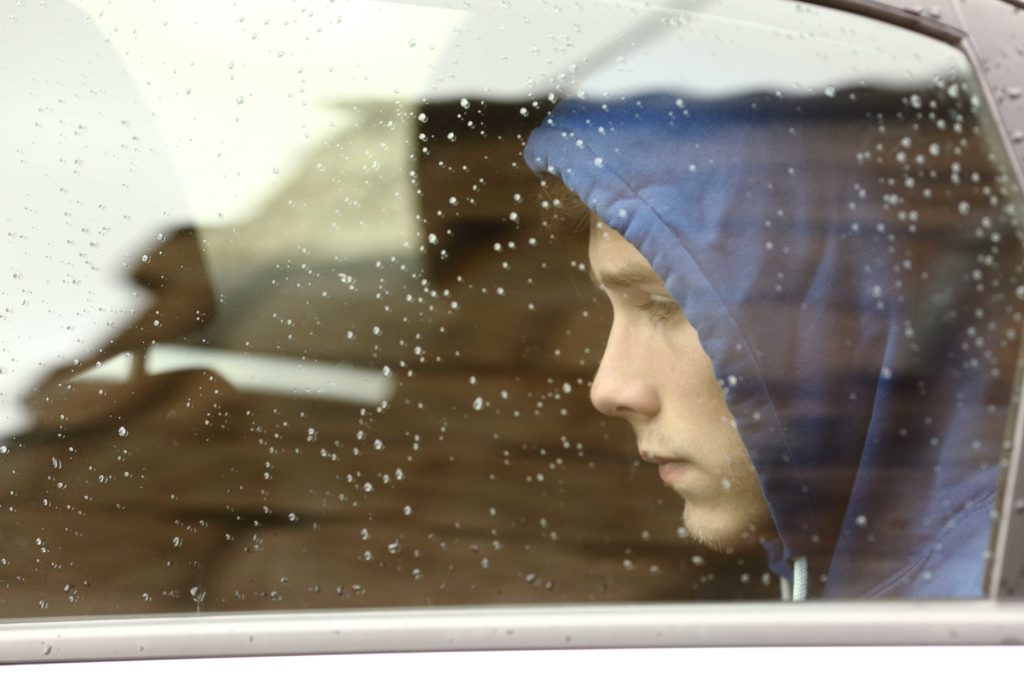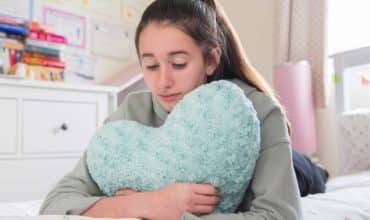
This is an anonymous post by a Parenting Teens and Tweens reader.
My son won’t graduate high school when I thought he would, and I’m okay with it.
Almost 18 years ago, my son sprang from the womb, ready to conquer the world.
He was a healthy, smiley, and fun child who thought life was a bowl of cherries. Energetic, sure, but well-behaved and adored by teachers and peers alike. He had a natural curiosity about science that we nurtured through books, exploring, and fun conversations.
Though socially outgoing, I saw early signs of anxiety that were consistent with our family history. As a licensed psychologist, I taught him about anxiety and coping skills.
Related: Three Practical and Effective Ways to Help Your Anxious Teen
Some kids have a predisposition to anxiety
His first existential crisis occurred in elementary school when he started crying while talking about the universe and how incredibly vast it is.
Scoring in the 99th percentile for IQ, our son was identified as academically gifted. The extra enrichment was helpful, as he had begun to exhibit some of the boredom and underachievement typical of advanced children.
Outside of school, he happily played with his brother and neighborhood friends. He participated in various sports. He came home every day to a stable, predictable, and loving home. He was thriving.
Middle school is rough for many parents and preteens, and our son was no exception.
He had difficulty completing his homework, and his grades weren’t up to potential.
We took a gentle but firm approach. Test scores were often 100%, but missing homework hurt him. He still managed to be inducted into the Junior National Honor Society. He continued to thrive socially, and he seemed to be able to keep his anxiety under control.
Related: It Broke My Heart to See My Son Suffer with Social Anxiety–Here Is How to Help
At 12 years old, our son chose to volunteer with developmentally disabled youth. We knew that his natural empathy, respect, and social skills would be a good fit for this population.
I was a bit nervous when he was paired with a nonverbal, profoundly intellectually disabled girl because I worried she might be too challenging for our young son. At the end of his first shift, I asked him how it went.
He smiled and said, “I want to work with that girl every time.”
Thus began a beautiful relationship between my son and a sweet but challenging and often ornery young woman that continues to this day. She is known as my son’s “best girl.”
We had all the developmentally timely talks with our son during the middle school years: puberty, sex, peer pressure, drugs, alcohol.
We were open with him that substance abuse runs on both sides of the family, although my husband and I were thankfully spared.
High school began uneventfully, but 9th grade was cut short by the COVID-19 pandemic. While his older brother seamlessly settled into his bedroom desk chair and virtual schooling, our 9th grader struggled hard with it.
We finally accepted what we had feared for years: our son might have ADHD.
It can be difficult to understand where challenging behavior is coming from
We had him evaluated, and he was diagnosed. We had a plan.
Medication seemed to help for a while. He got his driver’s license and his first job, and we remained patient but attentive as he struggled through 10th-grade remote schooling. He kept in touch with his ‘best girl’ via Facetime.
But the stumbling blocks kept happening. It was sometime during the pandemic that we became aware that our son had been experimenting with cannabis. We knew that the drug was rampant in our area’s youth, so we weren’t entirely surprised. We had open conversations with him about it. We continued our firm but loving approach. We reminded him over and over how his genetics render him especially vulnerable to addiction.
We hoped returning to a normal school environment would help, but that wasn’t the case.
He stopped showing up at his job, and his grades suffered. We faced the reality that our son would likely not gain acceptance into a four-year college and began discussing community college with him. His cannabis use was increasing, and he had begun using it for anxiety relief in addition to social use.
His doctor prescribed additional medication for the anxiety, and we placed him with a mental health counselor. However, his counselor was a poor fit, and he stopped after a few sessions.
After a while, he told us his anxiety was getting better and that he had stopped using cannabis. He got a new job and was doing well. He continued volunteering with his best girl, and our family had grown closer to hers. We were hopeful we were getting him back on track.
Related: Our Teen Was at Risk for Suicide, Here Are 7 Steps We Took Next
Senior year did not go as planned
His senior year was a disaster from the start. We had difficulty getting him to go to school. He forgot to get his car serviced and blew the engine.
We had the hard talks. We set limits. We found him a new counselor, although he only saw him a couple of times.
My husband and I had many conversations trying to figure out what to do. We fretted. We sought guidance from the school, professionals, and other parents. We considered military school, inpatient rehab, anything, and everything.
He passed the first semester, barely.
We started to look at other paths to graduation
Earlier this year, our son got yet another new job. He began to display a solid work ethic we hadn’t seen before, so we were cautiously optimistic.
However, his school attendance remained poor, so I met with the guidance counselor to discuss possible paths to graduation. We held out hope that he could turn things around.
In mid-April, my husband called and summoned me home. Our son was saying things that did not make sense. We brought him to the ER. He tested positive for THC and amphetamines (the latter due to his prescribed ADHD medication). The doctor theorized that he used a “bad batch” of cannabis and discharged him to home the same evening.
We were active and involved parents, and things still went wrong for our son
The next five days were hard.
I stayed home and held him as he cried uncontrollably. He was hearing voices and voiced paranoid delusions. He had withdrawal symptoms.
His psychiatrist discontinued his ADHD medication and added an antipsychotic.
Finally, he turned the corner, and his physical and mental health improved. He returned to school and work. He vowed to remain off recreational drugs and start seeing his counselor again.
It wasn’t long, however, before he came home from school and admitted that he took a hit off of a “cart,” which I have since learned is a vape cartridge ostensibly containing THC. The delusions briefly returned and then abated, and again my son renewed his vow to stop using cannabis.
It wasn’t long after that our son turned into a different person.
Our gentle and empathic son became rude and aggressive. He announced, with lots of profanity, that he was no longer a kid and would get cannabis. He tried to take our car keys. He began feverishly texting people, and we found out later he made a bizarre and serious accusation to a family friend.
We scrambled to formulate a game plan. I made the painful decision to go to the courthouse and complete involuntary civil commitment paperwork while his brother and father kept him as calm as possible at home. Shortly after I returned, I watched in horror as our sweet boy was escorted in handcuffs by three policemen from our home.
While his friends went to prom and attended all the fun senior activities, our son was pacing and mumbling to himself in a psychiatric hospital.
Related: Parenting Teens Means Dealing with Their Bad Choices
No parent is prepared for this type of situation
Although I’m a trained psychologist, I work with patients in an office setting. I had no idea how bleak the state of adolescent inpatient mental health is, no matter if you have insurance, money, or professional connections. After ten days of substandard inpatient care, our son was discharged.
We had him all set up for a partial hospitalization program (PHP) that he would attend six hours per day, six days a week, for substance abuse and mental health treatment.
The school agreed to a plan that would allow our son to graduate with his class even though he would not be returning to school. He was set up for recovery and success. We had hope.
We knew he wasn’t 100% when he came home, but you have to leave when you’re discharged from a hospital. The next 24 hours were spent on pins and needles as we watched him pace around, occasionally laughing to himself.
He admitted he was still hearing voices. Instead of starting PHP as planned the following morning, he sneaked out of the house and took an Uber to school.
Of course, we knew why.
We called the school, and they managed to locate him on campus. It was too late; he had already used cannabis.
We picked him up, brought him home, and then made the excruciating decision to have my son committed for the second time in two weeks, just 24 hours after his hospital discharge. Again, I watched police officers escort my son from our home in handcuffs.
We have since learned that our son was the fourth student from his school in three weeks to be hospitalized for the same symptoms. We also learned that he may have used synthetic cannabis, which is far more dangerous.
We have learned that between one-third to one-half of cases of cannabis-induced psychosis develop into a lifelong schizophrenia spectrum disorder, even with no family history.
We live in a non-legal state, so cannabis is unregulated. There is no telling what’s in it, although he has still not tested positive for any other drugs. The school is desperately trying to address the problem, but they have been unsuccessful so far.
We’re not angry at the school. We’re not angry at his friends. We’re not angry at him. We’re not angry at the hospitals.
We’re angry at the lack of funding and priority for health care, and specifically mental health care. Youth inpatient beds are scarce, and bureaucratic red tape keeps doctors’ time short and their hands tied.
Kids suffer in emergency rooms for days, sometimes weeks, before they can get into a psychiatric hospital and see an actual psychiatrist.
Related: Please Check In on that High School Senior Who Just Graduated
It is hard to accept when your child goes in a different direction, no matter what the reason
I had a difficult conversation with the school administrators and admitted that I no longer saw a path to graduation with his class. Graduation was looming, and our son is still sick and in a hospital.
It’s okay.
We had a plan for our kids’ milestones. We had hopes and dreams and expectations that are far different than our current ones.
When I look at pictures of him as a child, I see a happy, well-adjusted, bright, and caring little boy that is sure to graduate from high school and go on to conquer the world.
It isn’t working out the way I envisioned, but it’s okay.
High school graduation is a big deal for parents. It is a remarkable accomplishment, and the event marks a child’s entry into adulthood.
Many kids leave home for the first time shortly thereafter and begin making their first adult decisions. Their world suddenly becomes much bigger, and parents must take calculated steps backward, letting go with each step.
In our case, graduation has suddenly become less important, and it is not yet time for me to begin gracefully stepping back as a mother.
Instead, I’m fiercely advocating for his care and researching residential substance abuse programs for when he’s stable enough to go. Graduation is surprisingly low on our list of priorities.
I’m fighting for my son’s life within a broken mental health care system.
Our son will graduate, maybe even this year, but he will not get to walk with his class. It looks different than we thought it would.
And it’s okay.
Parenting teens and tweens is hard, but these articles may help:
Effective Strategies to Help Your Teen Cope with Panic Attacks
Eating Disorders Are on the Rise: Five Important Things Parents Need to Know
This Simple Analogy Can Help When Your Teen Doesn’t Feel “Good Enough”
As Parents of Teens, We Must Understand What Self-Harm Looks Like






Is it important for parents to discuss and support their teen’s sexual orientation, even if it goes against their own beliefs or values? How can parents navigate this conversation respectfully and provide a safe and accepting environment for their teen to explore and express their identity?”,
“refusal